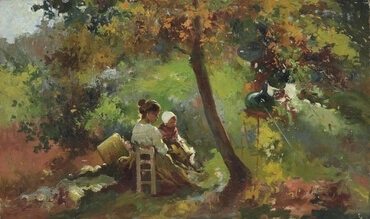Garden

Plants, in general, represent knowledge, ideas, and intellectual concepts -- things of the mind. Plant the best and most beautiful of those in one place, give them plenty of water (truth from the Lord about day-to-day things), plenty of sunlight (the Lord's wisdom) and warmth (the Lord's love), tend them to keep the weeds (false ideas) out, and you get a garden. So it makes sense that a garden in the Bible represents the intellect, where with proper care we can nurture the best and most useful ideas and ways of thinking.
(References: Arcana Coelestia 98, 100, 1588; Heaven and Hell 111)
Heaven and Hell #111
111. There is a similar correspondence with things in the vegetable kingdom. A garden, in general terms, corresponds to heaven in respect to intelligence and wisdom, which is why heaven is called the garden of God and a paradise, 1 and why we call it a heavenly paradise.
Trees, species by species, correspond to perceptions and firsthand knowledge of what is good and true, which yield intelligence and wisdom. So the early people, who were absorbed in the knowledge of correspondences, held their holy worship in groves. 2 This is why trees are mentioned so often in the Word and why heaven, the church, and people are compared to them - to the vine, for example, the olive, the cedar, and others - and the good we do is compared to fruit.
Further, the foods we derive from them, especially the ones we get from crops planted in fields, correspond to affections for what is good and true because they nourish our spiritual life the way earthly foods nourish our natural life. 3
Bread, generally speaking, corresponds to an affection for whatever is good because it is the mainstay of life and because it is used to mean all food. It is because of this correspondence that the Lord calls himself the bread of life; and it is also because of this that bread was put to holy use in the Israelite church - they did in fact place bread on the table in the tabernacle and called it "the bread of presence." Then too, all divine worship that they performed by sacrifices and burnt offerings was called "bread." Because of this correspondence too, the most sacred worship in the Christian church is the Holy Supper, in which bread and wine are shared. 4
Footnotes:
1. [Swedenborg's footnote] By reason of correspondence, a garden or paradise means intelligence and wisdom: 100, 108; from experience: 3220. Everything that corresponds has the same meaning in the Word as well: 2890 [2896?], 2987, 2989-2990, 2971 [2991?], 3002, 3225.
2. [Swedenborg's footnote] Trees mean perceptions and experiential knowledge: 103, 2163, 2682, 2722, 2972, 7692. So the early people held their divine worship in groves, under particular trees depending on their correspondence: 2722, 4552. On the inflow of heaven into members of the vegetable kingdom; for example, into trees and small plants: 3648.
3. [Swedenborg's footnote] By reason of correspondence, foods mean the kind of things that nourish our spiritual life: 3114, 4459, 4792, 4976, 5147, 5293, 5340, 5342, 5410, 5426, 5576, 5582, 5588, 5656 [5655?], 5915, 6277, 8562, 9003.
4. [Swedenborg's footnote] Bread means everything good that nourishes our spiritual life: 2165, 2177, 3478, 3735, 3813, 4211, 4217, 4735, 4976, 9323, 9545, 10686. The loaves that were on the table in the tabernacle have a similar meaning: 3478, 9545. Sacrifices in general were called "bread": 2165."Bread" includes all food: 2165. So it means all heavenly and spiritual food: 276, 680, 2165, 2177, 3478, 6118, 8410.






